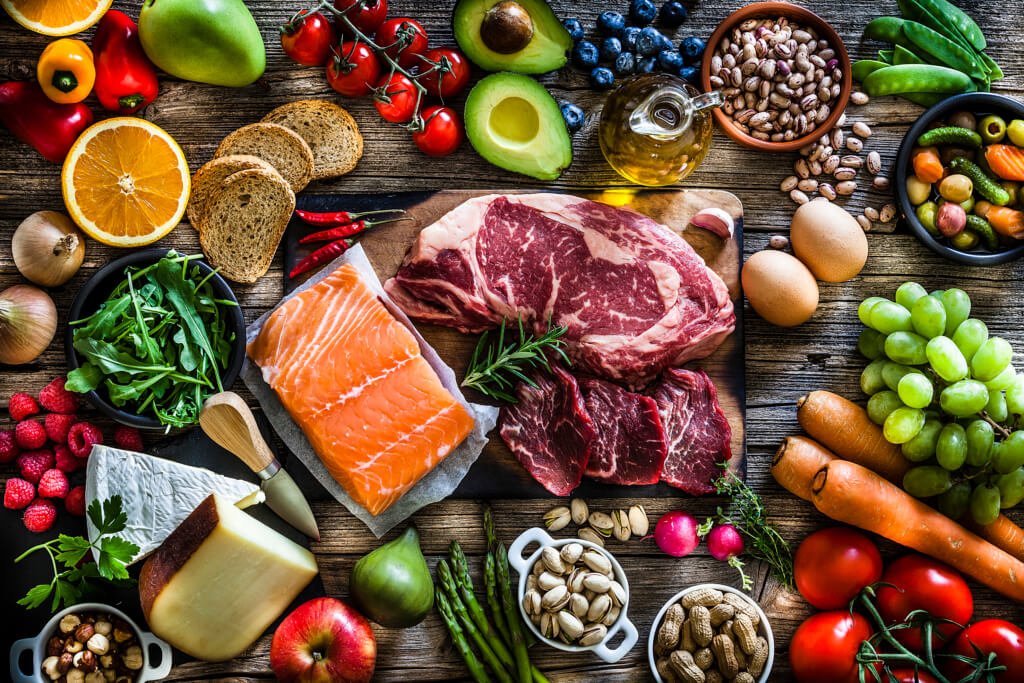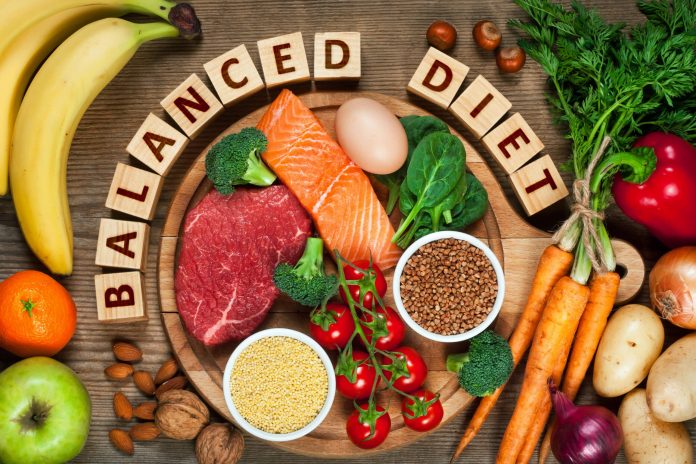Eating a balanced diet is essential to combat overweight and obesity, as well as other pathologies that are increasingly prevalent in today’s society. It is not about following a strict and restrictive diet, but providing the body with all the nutrients it needs to exercise its vital functions.
Do you want to eat healthy and adequate ? In this post we tell you how to achieve it in a simple way and all the benefits you will get for your health.
What is the diet?
Table of Contents
Do you know the etymology of the word ” diet “? It is very revealing, since it comes from the Greek díatia ( δίαιτα), which means “ way of life ”. And it is that, the way in which we feed ourselves constitutes a habit and therefore a way of living.
Also Read: How to prevent obesity
Although the word diet is often used -in error- to refer to restrictive regimes aimed at weight loss or linked to a disease, diet is, in reality, the set of foods, as well as their quantity and the frequency with which the one ingested.
In the case of human beings, food is conditioned by cultural, geographic, climatic, economic and social factors, and also by individual tastes.
Differences between diet, nutrition and diet
The terms food, nutrition and dietetics are sometimes used interchangeably, but you should know that they are not the same:
- Food refers to the entire process by which we supply our body with food, this process is essential for living beings to obtain energy. It includes both the preparation or cooking of food and its intake. It varies according to individual and social circumstances.
- Nutrition refers to the process in which the body transforms the food eaten, incorporating the nutrients present in them into the body.
- Dietetics is a discipline linked to food and nutrition, which studies the most appropriate foods and diet according to individual circumstances, such as age, sex or the presence of pathologies in order to maintain health.
What are nutrients?
As we have seen, nutrients are part of the food we eat in the eating process.
An adequate diet , which provides the body with the nutrients it needs, combined with regular physical activity, is key to enjoying good health. Conversely, a poor diet can have very negative effects, reducing the capacity of the immune system and reducing physical and mental energy to carry out basic activities normally.

Humans We need six major nutrient groups divided into two categories according to the amount needed:
- Macronutrients : we need them in greater quantity and their fundamental role is the supply of energy.
- Carbohydrates ( or carbohydrates, carbohydrates or hydrates): they serve to provide our body with the energy necessary to function.
They can be of two kinds:
- Simple : they decompose quickly and therefore provide energy quickly. For example, honey, sugar, or white rice.
- Complexes : They decompose more slowly, so they release energy more slowly. For example, pasta or whole wheat bread.
While its excessive intake can lead to diseases such as obesity or diabetes, its lack can result in fatigue or weakening of muscle tissue (as the body is forced to obtain energy from proteins).
- Proteins: they are formed by amino acids and in addition to providing energy they have a structural function, since they intervene in the formation of muscle tissue, enzymes, hormones, antibodies, etc. When there is a lack of these, health problems such as loss of muscle mass can occur.
There are 9 essential amino acids ( valine, leucine, isoleucine, threonine, lysine, methionine, histidine, phenylalanine, tryptophan ), that the body cannot synthesize that are essential for creating proteins, so they must be supplied through the diet. Proteins can be found in foods such as meat, fish, eggs, dairy, legumes and seafood.
- Lipids (or fats): they play an important role in our body, they mainly do not provide energy, they transport fat-soluble vitamins, and they are a structural part of cell membranes. We distinguish two types:
- Saturated fats : structurally they do not contain double bonds (unsaturations), hence its name. They are generally solid at room temperature and come from animals or some vegetable oils, such as coconut or palm. In general, they are not considered healthy fats and their consumption should be limited.
- Unsaturated fats : structurally they present at least one double bond. They are liquid at room temperature and are found in oils such as olive or sunflower. In turn, they are divided into monounsaturated and polyunsaturated fats depending on the number of double bonds they contain. These types of bonds modify the properties of lipids, which is why these fats are considered healthier. Within this group are Omega-3 fatty acids, necessary for proper brain development, anti-inflammatory and with protective properties in the face of cardiovascular events.
Lipids are necessary for the body, as they provide energy and protect vital organs, however they should be ingested in moderation since excessive consumption leads to increased cholesterol and obesity, among other pathologies.
- Micronutrients: they are necessary in very little quantity, but they are key for the proper functioning of the body. They usually have a reparative or plastic or regulatory function of certain cellular chemical reactions.
- Vitamins: They intervene in many biological processes and are found in both animal and vegetable foods, although the main source is fruits and vegetables. Each vitamin has specific functions. For example, vitamin C has an antioxidant effect protecting the body from oxidative stress, A is also an antioxidant and has a key role in vision and K is involved in blood clotting. It is important to include in the diet a great variety of fruits and vegetables and food in general, in this way we make sure to incorporate all the vitamins into our body.
- Minerals: They are also essential for many processes in the body. Both its absence and excess generate various pathologies depending on the mineral. For example, a lack of calcium can cause osteoporosis, while excess sodium can cause hypertension.
- Water: although it is not strictly considered a nutrient, given the importance of its daily intake we include it in this category. It has a fundamental role in the elimination of waste or digestion. We can provide it directly or through other products.
The importance of fiber
The fiber deserves a special mention, since, although not within the group of nutrients that can not be digested, contributes to important functions such as gastrointestinal transit, the absorption of water, removing cholesterol or glucose lowering in blood and the level of fatty acids.In addition, it constitutes the food of the intestinal microbiota or flora, which is a set of microorganisms found in our intestine. The microbiota plays a very important role in health, but we are beginning to discover the extent of its importance today. Among its functions we can highlight its participation in the immune system and digestive function. For all these reasons, it is necessary to include fiber in our diet through fruits, vegetables and whole grains.

The consequences of a lack of fiber can lead to diverticular disease of the colon, hemorrhoids, hiatus hernia, or varicose veins . Consuming foods rich in fiber you will contribute to the prevention of all these pathologies and, in addition, your cholesterol and risk of heart disease will be decreased.
There are two types of fiber:
- Soluble
- Insoluble
Insoluble fiber has a more important role in the regulation of intestinal transit, soluble fiber is more related to the reduction of cholesterol, glycemia, etc. Both must be part of a balanced diet.
What does a balanced diet consist of?
A balanced diet is one that consumes food from all the groups that we have seen, and that covers the recommended amounts of intake of each nutrient to ensure the proper functioning of the body.
We can graphically represent the balanced diet with the food pyramid. This can vary depending on different cultures. In Spain, for example, the nutritional pyramid is based on the Mediterranean diet, which has shown a very positive impact on the health of the population.
Also Read: How to gain weight in a healthy way
We must emphasize that in general there are no “good” and “bad” foods , but this quality is given by the frequency with which they are eaten, as well as by their composition. Obviously processed foods involve the intake of many additional substances to the nutrients themselves and limiting their consumption as much as possible is desirable.
In order to guide us when it comes to eating a balanced diet , there are food guides , manuals that show us in a simple way how to eat well.
The healthy eating pyramid, developed by SENC (Spanish Society of Community Nutrition) , is the most widely used tool today.
This pyramid separates food according to the frequency with which its consumption is recommended.
It is interpreted as follows:
At the base of the pyramid we find healthy lifestyle habits that must accompany the intake of nutrients, healthy culinary techniques that prevent the degradation of nutrients and an appropriate daily amount of water that allows the elimination of waste from the body.
- The foods at the base of the pyramid provide energy and we must consume them daily. They supply most of the carbohydrates, and are found in foods like cereals, rice, etc. It is an important sign that today cereals undergo a refinement process in which they lose many properties such as fiber, which is why its consumption in its integral form is recommended. From 4 to 6 servings of this group provide slow assimilation hydrates, making them an excellent source of energy.
- In the second step we have vegetables, fruits and vegetables. We will take more than two daily servings of vegetables and more than 3 daily of fruit.
The vegetables provide vitamins, minerals, fiber, antioxidants and phytochemicals that are associated with healthy aging and prevention of numerous diseases. A balanced diet must include a certain amount of fat, but we must be careful with the type to which it belongs, favoring the consumption of vegetable oils rather than fats of animal origin. Be careful with vegetable oils such as coconut or palm as they are rich in saturated fats, not as healthy as olive or sunflower.
- It is also recommended to consume dairy, fish or white meat daily. Dairy is an excellent source of calcium and protein. We can not overdo it because they have saturated fats that can unbalance the lipid profile. Fish and white meat are a source of protein low in fat and cholesterol and can also be included in the diet as a source of protein.
- Food of animal origin provides proteins of high biological value and should be taken at least once a day. A protein is considered of high biological value when it contains all the essential amino acids that our body needs to make our own proteins. Animal protein provides all the essential amino acids in addition to vitamins, iron, zinc, etc. Legumes provide fiber, linolenic acid and essential amino acids. Nuts are important sources of vegetable protein providing a large amount of energy.
- The red meat or processed meat provide protein and minerals but they also bring a lot of cholesterol and fat and should be consumed occasionally.
- The sweets, pastries, snacks and processed foods should be eaten occasionally so since their nutritional intake is poor and negatively impact on health.
The 6 pillars of a balanced diet
These are the six pillars on which a balanced diet is based :
- Adapted: it must be totally personalized to the particularities of each person, to their schedules, physical activity, economic conditions, age, health, etc.
- Complete: it must provide all the nutrients, fiber and water that our body needs in adequate amounts.
- Satisfactory: it is important that the food, the amounts and the preparations are appropriate and pleasant to feel satisfied, eating well does not have to be boring.
- Varied: in order to get away from the monotony it is advisable to vary our range of foods, in this way we ensure the contribution of all minerals and vitamins. In addition, we must ensure that they are fresh and seasonal.
- Balanced in energy: the supply of energy must be what we need, it is important for the proper functioning of our body not to overstep or fall short.
- Safe: it should not put our health at risk, preventing food poisoning and avoiding the intake of harmful components, such as pesticides in fruit and vegetables or abuse of additives.
A balanced diet: the best tool to take care of your health
As popular wisdom says “we are what we eat”. Indeed, food and health are closely linked. This is supported by numerous scientific studies. Recently an article in the prestigious magazine The Lancet stated how “eating badly causes more deaths a year than tobacco”. In his study on nutrition and health, he showed how eating unhealthy foods leads to a significant increase in serious health problems.
In addition to those exposed in this study, a poor diet can also cause other problems such as overweight and obesity , the latter classified by the WHO as a pandemic in non-infectious diseases.

Diet is one of the most powerful tools we have when it comes to preventing disease, so we must strive to ensure that it is balanced. In this way we provide our body with all the necessary nutrients, and in its proper measure, so that it properly executes all our biological functions. In addition, we reduce the risk of suffering short, medium and long-term pathologies related to inadequate nutrition: hypertension, diabetes, obesity, cardiovascular diseases, even certain types of cancer, etc. Commitment to a balanced diet is the best health insurance that we can buy with ourselves.
As you have seen, the benefits of a balanced diet, always combined with a healthy lifestyle , are undeniable. It is never too late to put it into practice, in fact an appropriate diet during breastfeeding favors the growth of the child and improves his cognitive development.
Now you have all the keys to start feeding properly. From Veritas we hope to have helped you with this post to understand the enormous benefits that a balanced diet has on your health and, above all, to have inspired you to put it into practice.











